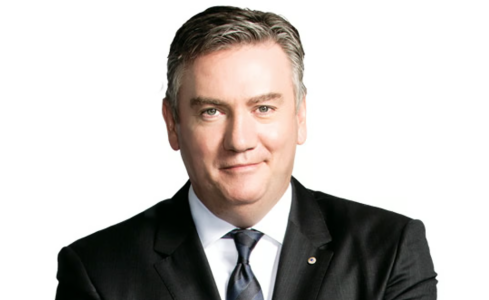Shocking scam alert: How TV icon got caught in 'disgusting' video scandal
By
Gian T
- Replies 6
In an era of captivating and complex technology, the rise of deepfake videos has opened new doors for deception.
A well-known Australian TV figure has recently been targeted in a concerning AI-driven scam, highlighting the growing risks of digital manipulation.
Experts warn that such schemes are becoming increasingly sophisticated and more complex to detect.
Eddie McGuire, a household name with a career spanning decades in the Australian media industry, was entangled in a web of deceit when scammers used his likeness to promote a fraudulent money-making scheme.
The elaborate ruse involved a YouTube advertisement that featured a deepfake—a convincingly altered video—of McGuire endorsing a financial venture that promised life-changing returns of $1,000 a day.
The Herald Sun reported that the deepfake clip replicated McGuire's image and manipulated his voice, adding an American accent to make the scam seem more convincing.
The fake Eddie McGuire in the video urged viewers to act quickly, claiming that their link to potential earnings would expire if they navigated away from the page.
'I've been the subject of Facebook scams many times,' McGuire expressed.
'Anything with me in it is completely fraudulent.'
The scammers appeared to have lifted footage of McGuire from one of his appearances on the Today show.
Their American origins were hinted at by their use of the word 'math' instead of the Australian 'maths.'
McGuire condemned the scammers as 'horrible, thieving people preying upon unsuspecting victims while trying to steal my identity—disgraceful and disgusting.'
Unfortunately, McGuire is not alone in this ordeal. Other prominent Australians, including Gina Rinehart, Dick Smith, David Koch, and Karl Stefanovic, have also had their images misappropriated in similar scams.
The fraudulent campaigns have even created fake news articles featuring celebrities like Sophie Monk and Robert Irwin, complete with doctored images and fabricated interviews, to lure people into parting with their money.
These scams have become so prevalent that they've prompted calls for social media companies to face stricter penalties for allowing such deceptive content to proliferate on their platforms.
The ACCC's ScamWatch has noted a significant increase in using celebrities and public figures in fake news and deepfake videos to promote fraudulent investment platforms.
For our readers at the Seniors Discount Club, it's crucial to stay vigilant and informed to protect yourselves from these sophisticated scams.
To avoid scams, stay skeptical of offers that seem too good to be true, as they often signal fraud.
Always verify the source by checking official channels, and never share personal or financial information based on unsolicited claims.
Report suspicious activity to authorities like ScamWatch or the Australian Cyber Security Centre.
Finally, keep informed about evolving online threats to recognise better and avoid scams.
 How can individuals protect themselves from increasingly sophisticated digital scams manipulating public figures' images? What responsibility should social media platforms have in preventing the spread of deceptive deepfake content? Share your thoughts and opinions in the comments below.
How can individuals protect themselves from increasingly sophisticated digital scams manipulating public figures' images? What responsibility should social media platforms have in preventing the spread of deceptive deepfake content? Share your thoughts and opinions in the comments below.
A well-known Australian TV figure has recently been targeted in a concerning AI-driven scam, highlighting the growing risks of digital manipulation.
Experts warn that such schemes are becoming increasingly sophisticated and more complex to detect.
Eddie McGuire, a household name with a career spanning decades in the Australian media industry, was entangled in a web of deceit when scammers used his likeness to promote a fraudulent money-making scheme.
The elaborate ruse involved a YouTube advertisement that featured a deepfake—a convincingly altered video—of McGuire endorsing a financial venture that promised life-changing returns of $1,000 a day.
The Herald Sun reported that the deepfake clip replicated McGuire's image and manipulated his voice, adding an American accent to make the scam seem more convincing.
The fake Eddie McGuire in the video urged viewers to act quickly, claiming that their link to potential earnings would expire if they navigated away from the page.
'I've been the subject of Facebook scams many times,' McGuire expressed.
'Anything with me in it is completely fraudulent.'
The scammers appeared to have lifted footage of McGuire from one of his appearances on the Today show.
Their American origins were hinted at by their use of the word 'math' instead of the Australian 'maths.'
McGuire condemned the scammers as 'horrible, thieving people preying upon unsuspecting victims while trying to steal my identity—disgraceful and disgusting.'
Unfortunately, McGuire is not alone in this ordeal. Other prominent Australians, including Gina Rinehart, Dick Smith, David Koch, and Karl Stefanovic, have also had their images misappropriated in similar scams.
The fraudulent campaigns have even created fake news articles featuring celebrities like Sophie Monk and Robert Irwin, complete with doctored images and fabricated interviews, to lure people into parting with their money.
These scams have become so prevalent that they've prompted calls for social media companies to face stricter penalties for allowing such deceptive content to proliferate on their platforms.
The ACCC's ScamWatch has noted a significant increase in using celebrities and public figures in fake news and deepfake videos to promote fraudulent investment platforms.
For our readers at the Seniors Discount Club, it's crucial to stay vigilant and informed to protect yourselves from these sophisticated scams.
To avoid scams, stay skeptical of offers that seem too good to be true, as they often signal fraud.
Always verify the source by checking official channels, and never share personal or financial information based on unsolicited claims.
Report suspicious activity to authorities like ScamWatch or the Australian Cyber Security Centre.
Finally, keep informed about evolving online threats to recognise better and avoid scams.
Key Takeaways
- Eddie McGuire has been targeted by scammers using a deepfake video on YouTube to promote a fake money-making scheme.
- The deepfake video falsely used McGuire's likeness and voice, albeit with an American accent, to falsely endorse a financial venture.
- Other Australian celebrities, such as Sophie Monk and Robert Irwin, have also been used in similar scams designed to deceive people and steal money.
- These scams have raised concerns about the spread of fake news and deepfake videos, with calls for tougher penalties for social media platforms that allow such content to circulate.








